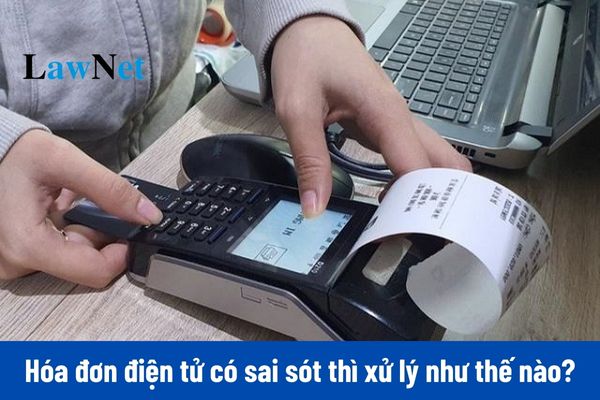How to handle an erroneous e-invoice that has been handled but then is found to have other errors in Vietnam?
How to handle an erroneous e-invoice that has been handled but then is found to have other errors in Vietnam?
Based on Clause 1, Article 7 of Circular 78/2021/TT-BTC, there are regulations on the handling of e-invoices sent to tax authorities with errors in certain cases as follows:
Handling e-Invoices, Summarized Data of e-Invoices Sent to Tax Authorities with Errors in Certain Cases
- For e-invoices:
a) In the case where the already issued e-invoice has errors requiring the tax authority’s code to be reissued, or the e-invoice with errors needs to be addressed in the form of adjustment or replacement according to the provisions in Article 19 of Decree 123/2020/ND-CP, the seller is allowed to use Form No. 04/SS-HDĐT in Appendix IA issued together with Decree 123/2020/ND-CP to notify the adjustment for each erroneous invoice or notify the adjustment for multiple erroneous e-invoices and send the notification using Form No. 04/SS-HDĐT to the tax authority at any time but no later than the last day of the value-added tax declaration period where the e-invoice adjustment arises;
b) In the case where the seller issues an invoice upon receiving payment in advance or while providing services as stipulated in Clause 2, Article 9 of Decree 123/2020/ND-CP, and there arises a cancellation or termination of service provision, the seller shall cancel the issued e-invoice and notify the tax authority of the invoice cancellation using Form No. 04/SS-HDĐT in Appendix IA issued together with Decree 123/2020/ND-CP;
c) In cases where the already issued e-invoice has errors and the seller has handled it by adjustment or replacement according to the provisions at point b, clause 2, Article 19 of Decree 123/2020/ND-CP, and later discovers that the invoice continues to have errors, subsequent handling shall follow the method applied when initially handling the errors;
d) According to the notification deadline recorded on Form No. 01/TB-RSDT in Appendix IB attached to Decree 123/2020/ND-CP, the seller shall notify the tax authority using Form No. 04/SS-HDĐT in Appendix IA issued together with Decree 123/2020/ND-CP regarding the check of the issued e-invoice with errors, specifying the review basis as the tax authority notification Form No. 01/TB-RSDT (including the number and date of the notification);
dd) In cases where the issued e-invoice lacks a form number symbol, invoice symbol, and invoice number with errors, the seller shall only adjust without canceling or replacing;
e) Specifically regarding errors in the value content on the invoice: make adjustments to increase (indicate as positive) or decrease (indicate as negative) accurately with the actual adjustment.
...
Thus, if an e-invoice issued has errors and has been handled according to the regulations but is later discovered to have continued errors, the subsequent handling shall still follow the method initially applied during the first error adjustment.

How to handle an erroneous e-invoice that has been handled but then is found to have other errors in Vietnam? (Image from the Internet)
What are the responsibilities of sellers using authenticated e-invoices in Vietnam?
Based on Article 22 of Decree 123/2020/ND-CP, the responsibilities of sellers using authenticated e-invoice are specified as follows:
- Manage the username and password of accounts granted by the tax authority.
- Create e-invoices for selling goods and providing services to send to the buyer, the tax authority, and e-invoice service providers, and take legal responsibility for the legitimacy and accuracy of the issued e-invoices.
- Transmit the data of tax authority-uncoded e-invoices to the tax authority through the e-portal of the General Department of Taxation (either directly or by sending through e-invoice service providers).
- Store and ensure the integrity of all e-invoices; comply with legal regulations on ensuring the safety and security of e-data systems.
- Comply with inspections, audits, and confrontations by the tax authority and other competent agencies according to the law.
What are prohibited acts for organizations and individuals using invoices in Vietnam?
Based on Clause 2, Article 5 of Decree 123/2020/ND-CP, regulations on prohibited acts in the field of invoices and documents for organizations and individuals selling, providing goods and services, and those with rights and obligations related, include:
- Conduct fraudulent acts such as using illegal invoices or unauthorized use of invoices.
- Obstruct tax officials in performing their official duties, specifically acts that damage the health and dignity of tax officials during inspections and audits on invoices and documents.
- Unauthorized access, alteration, or destruction of information systems regarding invoices and documents.
- Bribery or the conduct of other acts related to invoices and documents for illicit gains.

